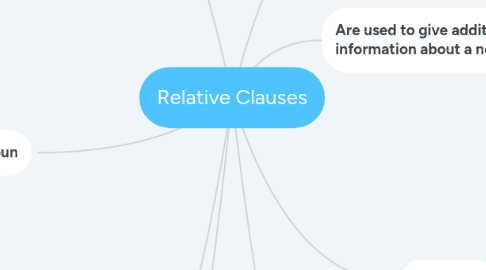
1. Form
1.1. Noun + relative pronoun + rest of clause
1.2. Commas
1.2.1. only non-defining
1.3. Positive
1.3.1. Ex: My father is the man who owns this restaurant
1.4. Negative
1.4.1. Ex: This isn't the sandwich that I ordered
1.5. Question
1.5.1. Ex: Are you the person who called earlier?
2. Relative Pronoun
2.1. People
2.1.1. Who
2.1.1.1. Subject and object relative
2.1.1.2. That, can always be used in place of who (it's less formal)
2.1.1.3. Ex: I know the woman who lives upstairs
2.1.2. Whom
2.1.2.1. More formal
2.1.2.2. Combination with a preposition
2.1.2.3. Ex: The boy from whom I found out about the accident gave me his phone number. (Formal)
2.2. Things
2.2.1. Which
2.2.1.1. That
2.2.1.2. What
2.2.1.2.1. Is an unusual relative pronoun
2.2.1.2.2. The thing wich or things wich
2.2.1.2.3. I don't know what I want for dinner. I don't know the thing which I want for dinner.
2.3. Possesions
2.3.1. Whose
2.3.1.1. Like my, your or its
2.3.1.2. Must be followed by a noun
2.3.1.3. Ex: That’s the guy whose car is a Ferrari.
3. Relative Adverbs
3.1. When
3.1.1. Time
3.1.1.1. Replce by wich and preposition
3.1.1.2. I was born during a time when the economy was strong. I was born during a time at which the economy was strong.
3.2. Where
3.2.1. Place
3.2.1.1. Replce by wich and preposition
3.2.1.2. She opened the cupboard where she kept her best glasses. She opened the cupboard in which she kept her best glasses.
4. Leaving out
4.1. Relative Pronouns (object)
4.1.1. The object of the relative clause (defining)
4.1.2. It can be left out
4.1.3. Very common in speech and writting
4.2. Relative Pronouns (subject)
4.2.1. The subject of the relative clause (non-defining)
4.2.2. It cannot be left out
5. 6 W
5.1. who/whom
5.2. what
5.3. which
5.4. whose
5.5. when
5.6. where
6. Two types
6.1. Defining
6.1.1. subject of the sentences
6.1.2. specify person/time/thing
6.1.3. sit immediately after the noun
6.1.4. It's essential
6.1.5. Ex: The pen wich I used is on the table
6.2. Non-defining
6.2.1. extra information
6.2.2. Non-essential
6.2.3. information to a noun
6.2.4. introduced and followed by the comma
6.2.5. Ex: My brother who is a doctor lives in France
7. Are used to give additional information about a noun
7.1. persons
7.2. place
7.3. thing
8. Formality and the preposition
8.1. Many relative can contain a preposition
8.1.1. In/on/from/for...
8.2. Two position
8.2.1. Before relative clauses
8.2.1.1. It's more formal
8.2.1.2. Writting English
8.2.1.3. She never met the baby for whom she would give her life. I've just reread the book from which I first learned English.
8.2.2. At the end of relative clauses
8.2.2.1. It's less formal
8.2.2.2. Spoken English
8.2.2.3. Ex:
